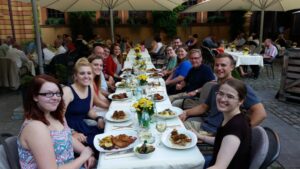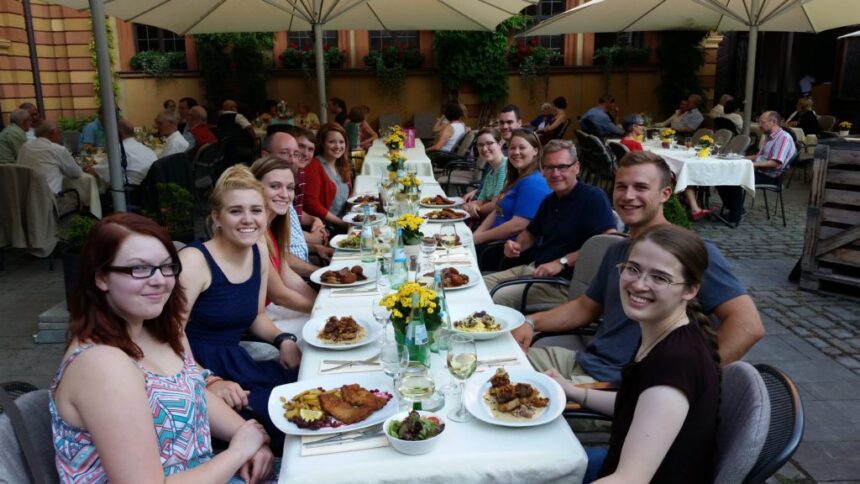
A group of sweaty students traipse down a cobblestone road through the the city center of Würzburg, Germany.
“Should we show them the bridge?” Professor of German Eberhard Geyer asks a colleague, and guides the group to take a turn right.
Moments later, they’re walking across the Alte Mainbrücke — a 500-year-old landmark of the town. A statue of Saint Killian — the town’s patron saint — glows in the sunset, as hundreds of tourists, university students, and Germans enjoy a glass of wine and each others’ company.
It’s July 2016, and Geyer’s begins his 34th summer teaching the German department’s program in Wurzburg, and the students are properly amazed. This summer’s program will be his 35th anniversary leading the program — after finishing his 35th year as a professor at Hillsdale.
“I never had any teacher-training,” Geyer said. “My university handed me the diploma and said ‘go teach.’ A successful teacher is somebody who can communicate a body of knowledge, and when I do it well, I enjoy it.”
If he’s proud of one thing he’s done in his thirty-five years at Hillsdale, Geyer said it’s establishing the college program in Würzburg.
“I came in ’85, in ’86 the program was up and running, and it runs still,” Geyer said.
Students spend a month in the small town in the German state of Bavaria, with daily immersion classes in which they learn new vocabulary, study great works of German literature, and learn German culture and history.
“It’s a small university town with a long history, beautiful architecture, a mediterranean flare, and good wine,” Geyer — who was himself once a student at Würzburg University — said.
During the program, students also visit Munich, Berlin, and Rothenburg ob der Tauber.
“The Würzburg program has really been a great asset,” Geyer said. “Many people declared a major, or became more interested in the language because of it.”
The program was one of Geyer’s goals when he decided to come to Hillsdale. Since his arrival on campus, he’s also established an exchange program with Saarland University.
Interest in the German program has grown immensely: enrollments in German courses have tripled since his early years. Twenty-three students are registered for the 400-level literature class Geyer will teach next semester.
“That’s a lot,” he said. “A 400-level literature class nationwide, you would have five to 10 people max. And often they teach it in English. When I started, I had six students in the literature classes. As I said, I would give credit to the colleagues I have right now, who are tireless and good teachers.”
Many of his students attribute their love of German to Geyer’s teaching style.
“I enjoyed how Dr. Geyer didn’t teach grammar and literature separately,” said Sarah Larson, a former student of Geyer’s, who’s now pursuing her Ph.D. in German Literature at the Ohio State University. “He would combine them seamlessly as we would read a text, and I only realized later how much about the language I had learned through reading different texts.”
His love of the great works he teaches is transparent, and his enthusiasm is infectious, students say.
“He comes into class and starts talking — he’s so energetic,” senior Christian Stoffel said. “He’ll be talking and talking, and then stop and say, ‘oh, hello guys!’ He has so much energy.”
Geyer’s favorite German works are Thomas Mann’s “Death in Venice,” E.T.A. Hoffman’s “Sandman,” and Franz Kafka’s “Metamorphosis.”
“I’m fascinated by the fact that this is a very simple story,” Geyer said of Kafka’s work. “It’s a horribly good story about human relationships, about love, power, control — even the prison that love can be.”
“What does it mean to be a vermin in your family?” he added. “Could it be an illness that burdens your family? The horribly fascinating thought that when somebody has suffered and been ill in a family and finally goes — is that not liberating, in a horrible way? It’s all there.”
While learning another language can be challenging and time consuming, Geyer encourages students in their studies.
“When we make you read literature very early on, the fact that you sometimes feel that you have to look up every other word is frustrating,” he said. “But then, later on, I feel that the pain becomes joy: when you can say something in another language, it adds to your life, just like a good novel gives you an escape into another life.”

